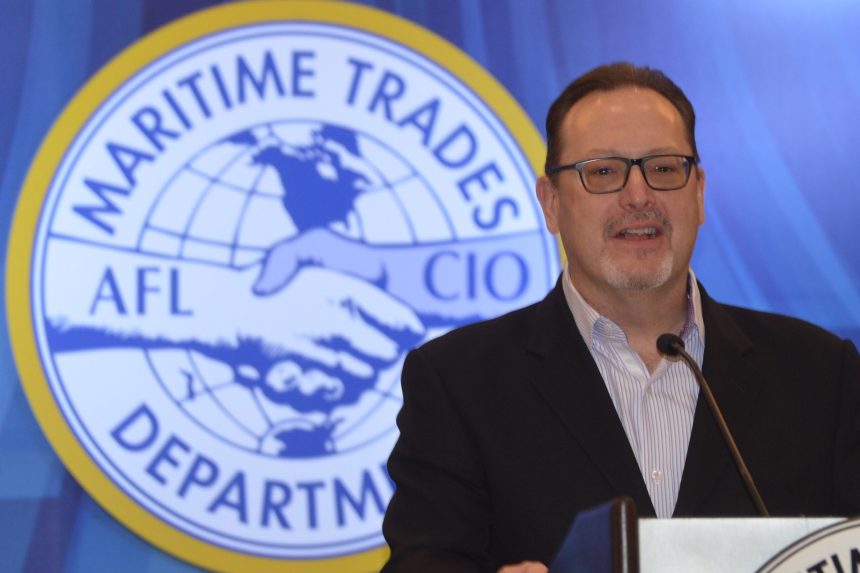America’s freight cabotage law remains crucial for the dredging industry, and it also plays a vital role as the nation expands into the wind-energy sector.
Those were among the key points Great Lakes Dredge & Dock (GLDD) Senior Vice President William Hanson was prepared to deliver February 17 at the Maritime Trades Department (MTD) Executive Board meeting in Lake Buena Vista, FL. However, an emergency prevented Hanson from attending, so Darrell Conner, a government affairs (including maritime) specialist from the law firm K&L Gates, delivered Hanson’s full address.
“For those not familiar with Great Lakes Dredge & Dock, it is the nation’s largest dredging company, with a large diverse fleet – a fleet in which they continue to invest,” Conner said. “Their specialty is the large deepening and widening projects like the first phase of the Port of Houston’s Project, which was just completed last week. But they also have worked in and expanded every major port in the country during their 131-year history.
“They also bring special expertise to coastal projects that protect our nation’s coasts, and have worked on virtually every beach or coastal project in the country, typically pumping sand from offshore borrow areas to beach fronts,” he continued. “The Jones Act and the Dredging Act are core to their industry, ensuring their vessels are U.S.-crewed, U.S.-built, and U.S.-owned. And [GLDD] currently has more than $300 million of new equipment under contract, including two new hopper dredges under construction now that will give us the most modern fleet in the U.S.”
After emphasizing the company’s unwavering focus on workplace safety, Conner noted that despite the dredging market being “flush with funding … the dredging industry is finding it challenging to get projects out to bid. Agencies are understaffed to deal with the increased level of funding. While we usually say thanks for any infrastructure spending, [GLDD] believes that more consistent annual funding can be more beneficial than one big funding bill…. As an example, Great Lakes suffered one of its worst financial years on record because the
Corps of Engineers was unable to get major deepening projects out to bid last year.”
Conner also pointed out that GLDD is believed to be “the first private U.S. maritime company to jump into the U.S. offshore wind market, making a major investment in a Jones Act-compliant rock installation vessel. This vessel is being built in a U.S. shipyard, the Philly Shipyard, by U.S. union workers; will be crewed by U.S. union labor; and will be owned by a U.S. company. This $250 million investment demonstrates to the Biden Administration that their efforts to support the Jones Act and create new markets for American companies and American labor is working.
It also shows the European developers that U.S. industry will build to meet the demand, and shows [GLDD’s] European competitors that the Jones Act is the law and their days working in U.S. waters with foreign-flag vessels are numbered!”
Conner described the high levels of interest in the wind sector from governors and other state politicians. “It is accompanied by interest in helping with the training and education of the union workforce to crew our new vessel,” he continued, again on behalf of Hanson. “Of course, that ship is but one of many U.S.-flag vessels, crewed by American workers, that will need to be built to satisfy this market. That’s opportunity.”
He concluded by describing the MTD and its affiliates as “great allies in the fight for more funding and policies to keep U.S. workers fully engaged in the maritime industries.”

